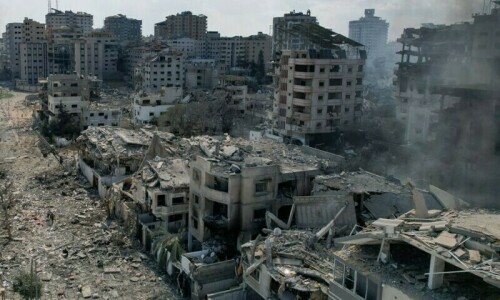KARACHI: “Gilgit-Baltistan is a unique case. It’s the region which is struggling since 1947 to integrate in Pakistan’s polity.” These views were expressed by IBA faculty member Sajjad Ahmad in an event organized recently to mark the 73rd independence day of Gilgit-Baltistan at the Institute of Business Administration, Karachi, says a press release.
The event ‘Celebrating Gilgit-Baltistan: History, Heritage and Politics’ was organized by the students of IBA who hail from GB, in collaboration with the Social Sciences and Liberal Arts department.
Mr Ahmad discussed the events that led to the war of liberation in GB from Dogra Raj. Giving the audience a brief history of the region, he explained the role of Gilgit Scouts, a paramilitary force, formed by British Indian Government to protect its northern border from possible Russian expansion towards the south. “The people’s aspirations were to be part of Pakistan. However, after acceding to Pakistan, government of Pakistan imposed colonial law of Frontier Crimes Regulation and governed the region through Political Agent, bureaucracy and federal ministry.”
Talking about the political struggle of GB and the reforms initiated by different governments, he said that it was the reform order of 2009 which despite falling short of people’s aspirations gave the region’s people an identity by changing the name from Northern Areas to Gilgit-Baltistan. “The struggle to fully integrate the region in Pakistan however goes on to this day”, he added.
Dr Huma Naaz Baqai, associate dean at IBA, spoke about the geostrategic importance of Gilgit-Baltistan. Dr Baqai also discussed the recent announcement of Prime Minister Imran Khan to make GB a provisional province.
Emphasizing the role of civilian governments to bring reforms in the region, she said that “Gilgit-Baltistan was heavily exploited during the military dictatorships, with the most regression during Ziaul Haq’s regime.”
Basharat Issa, lecturer from Habib University who belongs to GB, spoke on the political struggle of the people. Discussing the contemporary issues of the region, he said that the basis of Gilgit-Baltistan’s issues is the absence of social contract between the government and the people. He added that minimal credit for the region’s high literacy rate belongs to the government as most of the progress is made by non-governmental organizations. “The government looks towards NGOs to fix everything from roads to water taps in homes,” said Mr Issa, who further elaborated that this dependence for the region’s development has depoliticized the local people.
To further complicate matters, GB’s exoticization due to its strategic importance and beauty means that authority always remains with the federal government through the GB and AJK ministry. There are basic issues of infrastructure, health, power and higher education.
“People of Gilgit-Baltistan are optimistic that their grievances will be given due importance by the Pakistani government,” concluded Mr Issa.
The speeches were followed by an interactive question-answer session while the event ended with a cultural show in which students of IBA performed and played local music of the region.
Published in Dawn, November 6th, 2020













































Dear visitor, the comments section is undergoing an overhaul and will return soon.